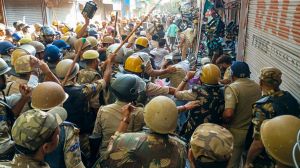China searches for survivors, toll nears 30,000
The United States Geological Survey reported a tremor of 6.1 magnitude on Sunday centred 80 km west of Guangyuan.

Thousands of soldiers and families looking for missing kin streamed into one of the worst affected areas of China’s massive earthquake on Sunday, as a strong new aftershock hit and the death toll neared 30,000.
Rescue workers have plucked more than 60 more survivors from the rubble following Monday’s quake in the southwestern Chinese province of Sichuan, even as hopes fade for the estimated 10,000 people or so still trapped under the rubble.
The United States Geological Survey reported a tremor of 6.1 magnitude early on Sunday centred 80 km west of Guangyuan, the latest in a series of aftershocks to hit Sichuan.
The official Xinhua news agency said there was no immediate word of additional damage or casualties in the area.
In the provincial capital, Chengdu, some 200 km south of the new tremor’s epicentre, buildings swayed and people rushed out into the streets, risking a soaking from a passing storm.
But nuclear facilities close to the affected zone, including China’s chief nuclear weapons research lab, are ‘all in a safe and controllable state’, Xinhua said.
In Beichuan, hard hit by the quake and which many people fled on Saturday following warnings a dam may collapse, worried relatives quarrelled with police who tried to prevent them entering the area, citing safety reasons.
“I’ve travelled all this way, and I don’t know where my father is,” said Chen Shiquan, who had come back from the neighbouring province of Qinghai where he works to look for this father, Chen Xiaoqu.
“To let me get this far and then not let me in is too cruel,” he added.
In Yingxiu, close to the epicentre of Monday’s 7.9 magnitude quake, at least 56 people were rescued, the official Xinhua news agency said.
Soldiers engaged in relief work “have their hands stained with blood and earth after days of searches in the debris”, Xinhua added.
Thousands of people have fled in the Beichuan area amid fears a lake could burst its banks, hampering rescue efforts after the deadliest earthquake in more than three decades.
At least one barrier lake, formed after rocks blocked a river, has burst its banks but caused no casualties, Xinhua said.
Fu Xingyue, looking for his daughter who was supposed to turn six the day after the quake happened, brushed off safety concerns.
“I don’t think the dam is a big threat, and anyway, there’s nothing I can do. I have to keep searching,” said Fu, who works as a truck driver and has spent days desperately searching though rubble and shouting out his daughter’s name.
BAD WEATHER, AFTERSHOCKS
Rescue work has been complicated by bad weather, treacherous terrain and hundreds of aftershocks.
President Hu Jintao urged emergency workers not to give up efforts to find survivors. “We should put people first and saving people’s lives is still the top priority of the relief work,” he said.
Offers of help have flooded in and rescue teams from Japan, Russia, Taiwan, South Korea and Singapore have arrived. Donations from home and abroad have topped 6 billion yuan ($858 million).
Fujiya Koji, head of the Japanese rescue team in Sichuan, told Reuters that chances of finding more survivors were low.
“We haven’t been able to find any survivors yet. Generally by this stage the likelihood of survival is low. They say they have been finding some in Beichuan and we’ll certainly keep trying,” he added.
China has said it expects the final death toll from the earthquake to exceed 50,000. About 4.8 million people have lost their homes and the days are numbered in which survivors can be found.
Premier Wen said the quake was ‘the biggest and most destructive’ since before the Communist revolution of 1949 and the quick response had helped reduce casualties.







- 01
- 02
- 03
- 04
- 05
























